The Airline Reservation Software Market is estimated to be valued at USD 6.8 billion in 2025 and is projected to reach USD 16.9 billion by 2035, registering a compound annual growth rate (CAGR) of 9.5% over the forecast period.
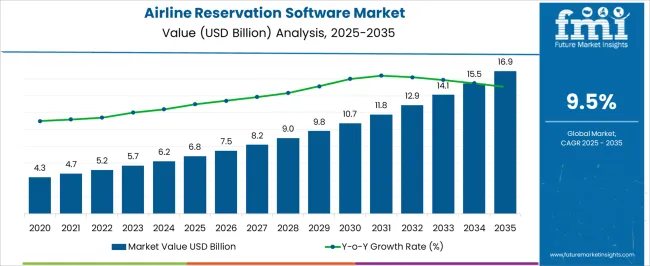
| Metric | Value |
|---|---|
| Airline Reservation Software Market Estimated Value in (2025 E) | USD 6.8 billion |
| Airline Reservation Software Market Forecast Value in (2035 F) | USD 16.9 billion |
| Forecast CAGR (2025 to 2035) | 9.5% |
The airline reservation software market is experiencing renewed growth momentum, supported by the global recovery of air travel and the accelerated adoption of cloud-based booking systems. Airlines, OTAs, and consolidators are increasingly prioritizing reservation systems that offer API-driven architecture, real-time inventory management, and seamless integration with payment gateways and loyalty platforms. This shift is being fueled by the growing demand for personalized travel experiences, dynamic pricing, and ancillary service bundling.
The emphasis on direct booking channels and cost optimization has led to the widespread adoption of multi-platform solutions that support both mobile and desktop interfaces. Additionally, increasing passenger volumes, route expansions, and strategic alliances between airlines and tech providers are reshaping distribution networks and digital retailing strategies.
As regulatory compliance, cybersecurity, and seamless customer experience gain importance, investments in scalable reservation platforms are set to intensify. Future growth will be influenced by innovations in AI-based fare forecasting, blockchain-enabled ticketing, and unified NDC adoption across global carriers.
The market is segmented by Type and Application and region. By Type, the market is divided into B2B Travel Portal and B2C booking engine. In terms of Application, the market is classified into International Airline Booking and Domestic Airline Booking. Regionally, the market is classified into North America, Latin America, Western Europe, Eastern Europe, Balkan & Baltic Countries, Russia & Belarus, Central Asia, East Asia, South Asia & Pacific, and the Middle East & Africa.
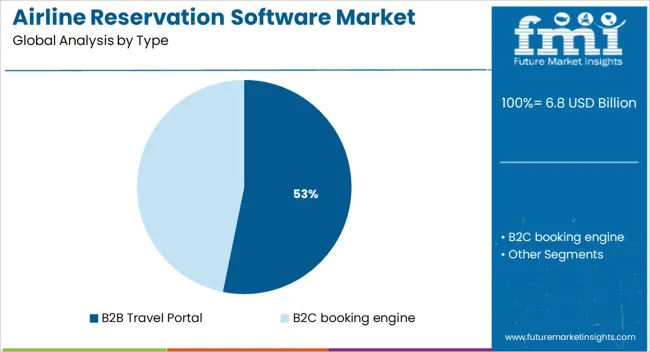
The B2B travel portal segment is projected to hold 53.2% of the total market share by 2025 within the type category, making it the leading segment. This dominance is being driven by the increasing reliance of travel agents, consolidators, and corporate travel providers on centralized platforms for managing multi-airline bookings, customized itineraries, and negotiated fare distribution.
B2B portals enable real-time access to global airline inventories, support bulk booking automation, and streamline ticketing operations, enhancing productivity and cost-efficiency for intermediaries. The rise of API-first architectures and white-label solutions has further accelerated platform adoption by small and medium-sized travel agencies.
Additionally, the ability to manage markups, commissions, and credit systems within a single interface has positioned B2B travel portals as essential infrastructure in travel distribution. Their scalability and compatibility with dynamic packaging tools have further reinforced their leading position in the airline reservation software landscape.
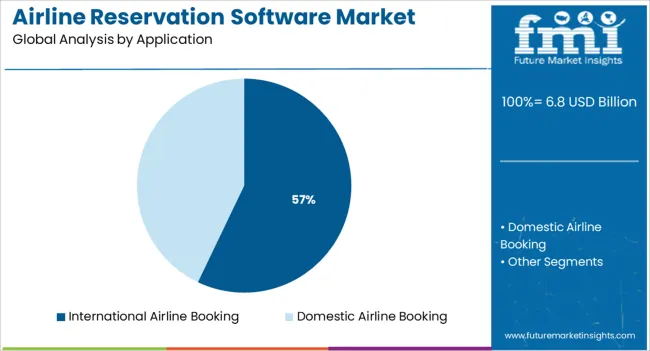
In terms of application, the international airline booking segment is expected to account for 57.1% of the total market revenue by 2025, making it the most prominent use case. The increasing volume of cross-border travel, supported by relaxed visa norms, rising disposable incomes, and global connectivity expansion, has elevated the need for sophisticated international booking capabilities.
Airlines and travel platforms have been investing in reservation engines that support multi-currency transactions, regional tax compliance, and multilingual user experiences to cater to diverse passenger segments. Moreover, the integration of global distribution systems with AI-enabled fare engines has enhanced transparency and flexibility in international itinerary management.
Demand for dynamic rebooking, real-time flight status updates, and multi-leg journey planning has further accelerated adoption. As airline alliances expand and global tourism rebounds, the international segment will continue to lead application growth in the airline reservation software market.
As per the Airline Reservation Software Market research by Future Market Insights - a market research and competitive intelligence provider, historically, from 2020 to 2024, the market value of the Airline Reservation Software Market increased at around 10.2% CAGR.
The Airline Reservation Software Market streamlines critical operations, focuses on automating resource-intensive back-office processes, and increases airline revenue through turbo-charged ancillary and e-commerce opportunities, all of which will drive market demand.
Nowadays, airline reservation software makes life easier for passengers because they do not have to stand in lines for hours to book seats; instead, they book with a single click, which drives the demand for Airline Reservation System Software Market. This software is also significantly fast and accurate, and it can be reserved or canceled at any moment and from any location.
The use of software improves efficiency and results in on-time schedule performance. It aids the vendor in the creation and maintenance of flight schedules and timings. It assists in viewing traveler lists as well as seat availability.
Despite the fact that it is a consumer-facing booking propulsion system for airline reservations, it also communicates with global distribution systems and can determine ticket prices and availability. The combination of internet penetration and smartphone use creates lucrative opportunities for the Global Airline Reservation Software Market.
Some restrictions are limiting the global airline reservation software market's growth. The poor coordination between government agencies and private enterprises in sharing data may pose additional challenges to market growth.
In 2024, North America held over 30% share of the airline reservation software market. This is due to the advent of cloud technologies by businesses. Over the forecast period, the Asia Pacific market for Airline reservation software is expected to increase substantially.
Furthermore, the availability of software on mobile phones and the increasing emergence of technological advancements are driving demand for software in North America and Europe. Similarly, demand for software in Latin America, the Middle East, and Africa, as well as Asia Pacific, is expected to rise as cloud infrastructure develops in these regions. Besides, machine learning and artificial intelligence is expected to drive the North American Airline reservation software market.
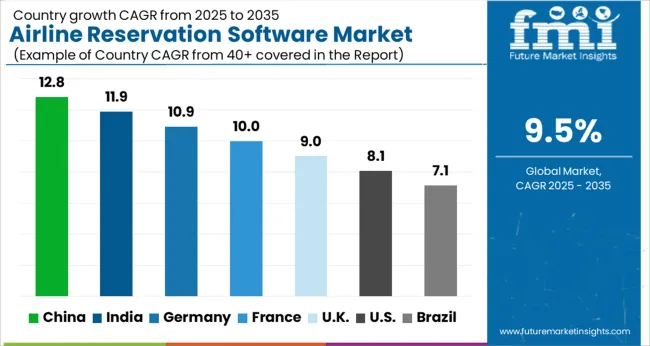
The United States is expected to account for the largest market share of USD 16.9 Bn by the end of 2035. Europe is the fastest growing country in the upcoming years. The increased demand for airline reservation software in this region is due to an increase in air passenger traffic and the growth of MICE tourism, which necessitates a comprehensive range of traveler solutions such as ticketing, check-in, and security management.
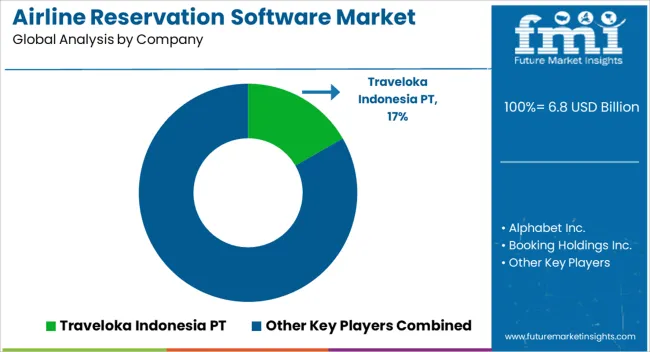
Due to the growth in the multitude of employee business trips, and widespread integration of the software in key corporations. Moreover, small and medium-sized enterprises are expected to grow faster during the forecast period as they look to adopt airline software and optimize their manual procedures in order to gain a better ROI. Furthermore, the software assists organizations in transitioning away from the traditional methods of account management and provides an automated method of maintaining ledgers.
The prominent players in the airline reservation software market are Airmax Systems, Provab ARS, VIDECOM design, SkyVantage, Results Reservation System, Kiu RES Airline Solutions Suite, Blue Sky Booking, SabreSonic Res, RezG-Package, AvAIO, Odysseus Solutions, Crane PAX, Sabre Airline Merchandising, Takeflite Reservation System, aeroLINE, AirKiosk system, Bird Group, iFly Res, and AmeliaRES.
Some of recent developments for Airline Reservation Software Market are:
In November 2024, Sabre Corporation, the leading software and technology corporation that powers the international travel industry that includes airline reservation software, announced the release of the first two products in the company's Retail Intelligence suite: Sabre Air Price IQ and Sabre Ancillary IQ, which are designed to dynamically price airfare and ancillaries, respectively.
Sabre Retail Intelligence is a suite that empowers airlines to deliver personalized travel offers through both traditional and non-traditional channels. Retail Intelligence, powered by Sabre Travel AITM - an innovative capability that integrates Sabre technology with Google Cloud's cutting-edge AI technologies and improved machine-learning services - will enable airlines to adaptively provide offers to travelers based on user preferences, marketplace insights, and purchase probability, resulting in a more personalized and better traveler experience.
In May 2025, Kiu System Solutions, a leading technology provider for the travel sector, announced that it has won a client in Colombia. Sarpa Airlines has signed contracts for the systems Kiu PSS, Kiu DCS for check-in, Kiu GDS for worldwide spread through travel companies, Kiu E-commerce, and Kiu Admin for revenue accounting. Similarly, they plan to sign up for Kiu Business Intelligence in the near future to expand their use of Kiu's suite of solutions.
Sarpa, a company with extensive experience in the aviation sector, will gain the versatility to endorse their sales strategies and, as a result, will be able to provide greater client satisfaction through new and innovative products as a result of this new tech and distribution expansion.
Similarly, more recent developments related to companies in Airline Reservation Software Market services have been tracked by the team at Future Market Insights, which are available in the full report.
The global airline reservation software market is estimated to be valued at USD 6.8 billion in 2025.
The market size for the airline reservation software market is projected to reach USD 16.9 billion by 2035.
The airline reservation software market is expected to grow at a 9.5% CAGR between 2025 and 2035.
The key product types in airline reservation software market are b2b travel portal and b2c booking engine.
In terms of application, international airline booking segment to command 57.1% share in the airline reservation software market in 2025.






Our Research Products

The "Full Research Suite" delivers actionable market intel, deep dives on markets or technologies, so clients act faster, cut risk, and unlock growth.

The Leaderboard benchmarks and ranks top vendors, classifying them as Established Leaders, Leading Challengers, or Disruptors & Challengers.

Locates where complements amplify value and substitutes erode it, forecasting net impact by horizon

We deliver granular, decision-grade intel: market sizing, 5-year forecasts, pricing, adoption, usage, revenue, and operational KPIs—plus competitor tracking, regulation, and value chains—across 60 countries broadly.

Spot the shifts before they hit your P&L. We track inflection points, adoption curves, pricing moves, and ecosystem plays to show where demand is heading, why it is changing, and what to do next across high-growth markets and disruptive tech

Real-time reads of user behavior. We track shifting priorities, perceptions of today’s and next-gen services, and provider experience, then pace how fast tech moves from trial to adoption, blending buyer, consumer, and channel inputs with social signals (#WhySwitch, #UX).

Partner with our analyst team to build a custom report designed around your business priorities. From analysing market trends to assessing competitors or crafting bespoke datasets, we tailor insights to your needs.
Supplier Intelligence
Discovery & Profiling
Capacity & Footprint
Performance & Risk
Compliance & Governance
Commercial Readiness
Who Supplies Whom
Scorecards & Shortlists
Playbooks & Docs
Category Intelligence
Definition & Scope
Demand & Use Cases
Cost Drivers
Market Structure
Supply Chain Map
Trade & Policy
Operating Norms
Deliverables
Buyer Intelligence
Account Basics
Spend & Scope
Procurement Model
Vendor Requirements
Terms & Policies
Entry Strategy
Pain Points & Triggers
Outputs
Pricing Analysis
Benchmarks
Trends
Should-Cost
Indexation
Landed Cost
Commercial Terms
Deliverables
Brand Analysis
Positioning & Value Prop
Share & Presence
Customer Evidence
Go-to-Market
Digital & Reputation
Compliance & Trust
KPIs & Gaps
Outputs
Full Research Suite comprises of:
Market outlook & trends analysis
Interviews & case studies
Strategic recommendations
Vendor profiles & capabilities analysis
5-year forecasts
8 regions and 60+ country-level data splits
Market segment data splits
12 months of continuous data updates
DELIVERED AS:
PDF EXCEL ONLINE
Airline Technology Integration Market Size and Share Forecast Outlook 2025 to 2035
Airline Cyber Security Market Size and Share Forecast Outlook 2025 to 2035
Airline A-la-carte Services Market Analysis by Product Type, Carrier Type and Region from 2025 to 2035
Airline Crisis Management Software Market Size and Share Forecast Outlook 2025 to 2035
Online Airline Booking Platform Market Size and Share Forecast Outlook 2025 to 2035
Cryopreservation Systems Market Size and Share Forecast Outlook 2025 to 2035
Cryopreservation Freezers Market Outlook – Size & Forecast 2025-2035
Cryopreservation for In-vitro Fertilization (IVF) Market - Trends & Forecast 2025 to 2035
Cryopreservation Cell Lines Market
Food Preservation Equipment Market Size and Share Forecast Outlook 2025 to 2035
Market Share Distribution Among Wood Preservation Chemicals Companies
Organ Preservation Solution Market Size and Share Forecast Outlook 2025 to 2035
Organ Preservation & Perfusion Products Market Size and Share Forecast Outlook 2025 to 2035
Organ Preservation Market Size and Share Forecast Outlook 2025 to 2035
Motion Preservation Devices Market Size and Share Forecast Outlook 2025 to 2035
Hotel Central Reservation System Market Size and Share Forecast Outlook 2025 to 2035
Spinal Motion-Preservation Devices Market
Software-Defined Wide Area Network Market Size and Share Forecast Outlook 2025 to 2035
Software Defined Vehicle Market Size and Share Forecast Outlook 2025 to 2035
Software Defined Networking (SDN) And Network Function Virtualization (NFV) Market Size and Share Forecast Outlook 2025 to 2035

Thank you!
You will receive an email from our Business Development Manager. Please be sure to check your SPAM/JUNK folder too.
Chat With
MaRIA